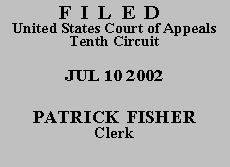

| UNITED STATES OF AMERICA,
Plaintiff - Appellee, v. NATHAN BROWN, also known as Lil Nate, Defendant - Appellant. |
|
Defendant-appellant Nathan Brown entered a conditional guilty plea to possession with intent to distribute five grams or more of cocaine base in violation of 21 U.S.C. § 841(a)(1), (b)(1)(B)(iii), reserving for appeal the issue of whether the district court erred in denying his motion to suppress evidence. See Fed. R. Crim. P. 11(a)(2). The district court sentenced Mr. Brown to thirty months' imprisonment and assessed $100 in costs. On appeal, Mr Brown argues that the district court's findings regarding his motion to suppress were clearly erroneous. We exercise jurisdiction pursuant to 28 U.S.C. § 1291, and affirm the district court's denial of the motion to suppress and Mr. Brown's conviction and sentence.
Mr. Brown was a passenger in a vehicle stopped by two Denver police officers for a defective license plate light on July 8, 1999 at approximately 11:00 p.m. Neither the driver nor Mr. Brown were able to produce any identification or explain the presence of tires and rims in the car's backseat. Also, the driver could not produce a driver's license, vehicle registration or proof of insurance. Although the driver claimed the car belonged to Mr. Brown, Mr. Brown denied it. The officers ordered Mr. Brown and the driver to exit the car and patted them down for weapons and identification. Officer Dempsey felt a hard object, which he described as consistent with crack cocaine, in Mr. Brown's crotch area. When Officer Dempsey tried to handcuff Mr. Brown, he pulled away and ran. After a short chase, the officers apprehended Mr. Brown. Incident to an arrest, the officers found a package containing eighteen grams of cocaine base in the crotch area of Mr. Brown's underwear.
A traffic stop, such as occurred here, was a seizure within the meaning of the Fourth Amendment, and therefore the stop was constitutional only if it was reasonable. See United States v. Callarman, 273 F.3d 1284, 1286 (10th Cir. 2001) (citing Delaware v. Prouse, 440 U.S. 648, 653-54 (1979)), cert. denied, 122 S. Ct. 1950 (2002). Reasonableness is judged using the two-part standard set forth in Terry v. Ohio, 392 U.S. 1, 19-20 (1968): the stop must be "'justified at its inception'" and it must be "'reasonably related in scope to the circumstances which justified the interference in the first place.'" United States v. Botero-Ospina, 71 F.3d 783, 786 (10th Cir. 1995) (en banc) (quoting Terry).
Mr. Brown now concedes the initial stop was valid. Thus, the relevant inquiry on appeal is only whether it was reasonable, under the circumstances, for the officers to order Mr. Brown to exit the car and to submit to a pat-down. In addressing this question, the district court found, under the circumstances set out above, that the officers' conduct in removing and patting-down Mr. Brown "was reasonable in scope and conducted for a legitimate investigatory purpose." R. vol. 1, tab 675 at 3. Further, the court found that the search of Mr. Brown's person and the seizure of the crack cocaine was incident to a lawful arrest.
After reviewing the record in the light most favorable to the government, considering the totality of the circumstances and deferring to the district court's assessment of the credibility of the witnesses, we conclude that the district court's factual findings are not clearly erroneous. See, e.g., United States v. Long, 176 F.3d 1304, 1307 (10th Cir. 1999). Upon de novo review of the legal question presented, we agree with the district court's ultimate determination of reasonableness under the Fourth Amendment. See United States v. Caro, 248 F.3d 1240, 1243 (10th Cir. 2001).
Thus, Mr. Brown's argument that the officers' "motive for the stop was to identify and search the individuals and not to pursue a minor traffic violation" is unpersuasive. Appellant's Br. at 5. And the record specifically refutes his further argument that the officers never expressed concern for their safety and never were in a vulnerable position. See R. vol. 3 at 7; id. vol. 4 at 38-39.
Accordingly, the judgment of the United States District Court for the District of Coloradois AFFIRMED.
Entered for the Court
Senior Circuit Judge
*. This order and judgment is not binding precedent, except under the doctrines of law of the case, res judicata, and collateral estoppel. The court generally disfavors the citation of orders and judgments; nevertheless, an order and judgment may be cited under the terms and conditions of 10th Cir. R. 36.3.